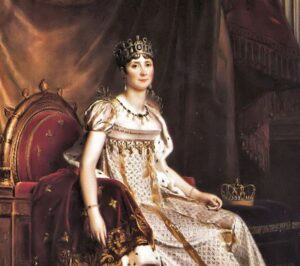A Surprising Marriage
At the time of her marriage to Napoleon, Josephine had already ascended to the height of the French social elite. She was a fashion icon along with her friend Thérésia Tallien, and was a close friend, if not lover, of Paul Barras, one of the most powerful men in France at the time of Napoleon’s proposal. It was surprising to her contemporaries then, that Josephine married a head-over-heels Napoleon, who was six years younger with few military accomplishments or fame to his name. Even Josephine seemed ambivalent about the matter and didn’t invite her own children or many of her close friends to the wedding.
To understand Josephine’s motivations for accepting Napoleon’s proposal, I’m drawing upon a wonderful biography about Josephine, The Rose of Martinique.
Josephine’s main reasons for marrying Napoleon may have been:
- Stability secured by Napoleon’s adoration
- Other failed romances
- Fulfillment of a prophecy
Josephine Enjoyed Napoleon’s Adoration
Josephine’s first marriage to Alexandre de Beauharnais was a painful experience for Josephine. Josephine, just sixteen, entered the marriage doe-eyed and adoring of her dashing husband. Unfortunately, Alexandre was an openly serial adulterer and constantly chastised Josephine for not living up to the high intellectual and social standards of French nobility. Though the couple had two children together, their marriage ended in a messy separation.
As an aristocratic woman, Josephine had little means of supporting herself and her children, especially after her husband was guillotined during the Reign of Terror. Though she managed to secure money through her connections and find other lovers, she may have felt the pressure to marry to secure her family’s future while she was still a prize catch.
Napoleon had few financial resources, which concerned Josephine’s friends. One even warned her: caution: “this man brings you nothing but his cloak and his sword.”1 Even more risky, he was a military man that could fall in battle at any time. But what Napoleon did provide was utter adoration. He was completely obsessed with Josephine, saying “‘I followed her everywhere; I was passionately in love with her.”2
To Josephine, this obsession was both disquieting and, at least partially, intriguing: “his gaze has something singular about it that fascinates me.”3 After the tumultuous years of Josephine’s life in which she was cheated on, imprisoned during the Reign of Terror, and forced to beg others for money, one must wonder whether Napoleon’s adoration made Josephine comfortingly feel in control—she knew he’d do whatever she wanted and she could finally have a stable relationship if she so desired.
Josephine’s Other Romances Failed
At the time of meeting Napoleon, Josephine romantically was involved with one if not two people. The first was General Lazare Hoche, whom Josephine had met in prison during the Reign of Terror. Although they shared a passionate affair, Hoche ultimately did not leave his wife for Josephine. She tellingly accepted Napoleon’s proposal not long after Hoche left Paris to return to his wife.
Josephine was also rumored to be having an affair with Paul Barras, then one of the most prominent politicians in all of France. There seems to be at least some disagreement about whether she and Barras were truly romantically involved. Regardless, either Barras tired of his relationship with Josephine and recommended her to Napoleon, or simply was connecting his friend to his new protégé in a marriage he thought would benefit both parties. Without another ready prospect, Josephine must have found it hard to ignore Napoleon’s eager advances.
Fulfillment of a Prophesy
Though it may sound strange to modern ears, Josephine may have been inspired to marry Napoleon due to a prophecy she received from a fortuneteller during her childhood in Martinique. According to the fortuneteller, Josephine would one day marry “a dark man of little fortune” who would cover “the world with glory” and make her “greater than a queen.”4
Josephine, true to her Caribbean roots, strongly believed in the prophecy. During the Reign of Terror, the warden of her prison told her she was soon to be guillotined, causing her friends in the prison to despair. But Josephine calmly “told them that their sadness was senseless, that I could not die, because the prophecy said I would be Queen of France.”5
Proposed to by an ambitious general with little fortune to his name, perhaps Josephine sensed her destiny was being fulfilled. Indeed, Napoleon gifted Josephine with a medallion that read, “To Destiny”, which she wore on the wedding day. It’s difficult not to wonder if Josephine had shared the details of the prophecy with Napoleon and the two were bound by a sense of fate.
Josephine’s belief in the prophecy can help explain why she went through with a marriage that embarrassed her and was, by the estimation of many of her contemporaries, beneath her. Of all the reasons for marrying Napoleon, I think this may be the most likely.
The Start of One of the Most Famous Romances in History
Upon these shaky foundations, Josephine’s marriage to Napoleon began. Though Josephine initially started an affair, the surprising result was one of the most famous romances in history, one that Josephine seemed to grow passionately into over time. Indeed, Josephine, already divorced from Napoleon but severely stressed by Napoleon’s defeats, passed away shortly after receiving the news that Napoleon was to be exiled. And the last word on Napoleon’s lips before he died: “Josephine.”
- Stuart, Andrea. The Rose of Martinique: A Life of Napoleon’s Josephine (p. 176). Grove Atlantic. Kindle Edition. ↩︎
- Stuart, Andrea. The Rose of Martinique: A Life of Napoleon’s Josephine (p. 173). Grove Atlantic. Kindle Edition. ↩︎
- Stuart, Andrea. The Rose of Martinique: A Life of Napoleon’s Josephine (p. 177). Grove Atlantic. Kindle Edition. ↩︎
- Stuart, Andrea. The Rose of Martinique: A Life of Napoleon’s Josephine (p. 27). Grove Atlantic. Kindle Edition. ↩︎
- Stuart, Andrea. The Rose of Martinique: A Life of Napoleon’s Josephine (p. 136). Grove Atlantic. Kindle Edition. ↩︎



